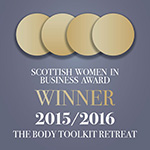My column for Holistic Scotland Magazine this summer focuses on the importance of listening to our bodies. In a world of conflicting and confusing dietary advice, I've come to the realisation that the best way to navigate our way through it all is to tune in, see what works for us and in many ways, become our own expert.
When it comes to navigating the world of health and nutrition, it can feel like a minefield. So many experts passionately promote their take on how best to achieve optimal health that no matter what we read or hear, someone, somewhere will almost certainly be able to offer us a contradictory view. It’s no wonder that the majority of people that I meet feel utterly confused about what they should and shouldn’t be doing health-wise.
Vegan, or paleo? Ketogenic, or plant-based? Red wine, or zero wine? ‘Breakfast like a King,’ or intermittent-fasting?
We’re bombarded with conflicting advice. I pretty much tried all of the above at some point on my health journey, but the conclusion I have come to is that in a world of conflicting and overwhelming information, the best approach is to focus our attention inwards, by tuning in and listening to our bodies to see what genuinely works for us.
Listening to our bodies is something that can take a bit of practice, as we don’t always want to hear what the body has to say, especially when we’re in pain or discomfort. But our bodies are constantly talking to us, and at the retreats I encourage people to start listening to their bodies with compassion, rather than judgement.
In order to have compassion for our own bodies, the first step is to recognise and appreciate that the body is always striving to keep us well – arguably the body’s default setting is to heal. If I break a bone, or cut myself, my body will do what it can with the tools and materials I have given it, to repair the bone, or knit that wound. Therefore, when the body is unhappy in some way, or when it is in pain or inflamed, it’s like receiving a notification that something we are doing is not serving us, or may be causing us harm.
For every action we take, every piece of food that we eat, and even every thought that we think, the body responds - the feedback loop is always there. The trouble is that as a society we have been slowly detaching ourselves from reading our bodies’ ‘messages’, especially when they’re inconvenient things like a headache.
In the case of a sore head, most of us would pop a painkiller, because we’re busy and have things to do. But imagine you were driving down the motorway at high speed and a warning light appeared on the dashboard. If the warning light is an analogy for the headache, taking a painkiller would be like pulling the car over onto the hard-shoulder and taking the fuse out of the dashboard, to turn the warning light off, so that you could carry on driving uninterrupted. Of course, that would be dangerous, but the same could be true for our bodies – if a headache comes on, it is just like a warning light on a car dashboard, it’s a white flag from the body alerting us to the fact that something is out of balance and needing our attention.
Tuning in and listening to our bodies is worth the practice; what works for one person, might not work for us. With that philosophy in mind, the ‘dietary approach’ I wholeheartedly promote to my clients post-retreat is to keep a food diary, to record what they have eaten and how they have felt, with the intention of trying to join those dots.
I don’t tell anyone to go vegan, paleo or to follow the 5:2 diet – but I do encourage them to experiment, tune in and see what works for them – in essence, become their own experts. Of course, I am a big believer in juicing and the healing power of Mother Nature’s raw fruits and vegetables - I run a juice detox retreat after all – but I encourage people to really tune in as they re-introduce foods into their diet, and consciously notice how they feel as a result.
The feedback loops are always there, and our bodies are always trying to keep us as alive and as well as possible. In the age of lifestyle disease and mental health epidemics, we need to take responsibility for our own health by rekindling our compassion for our bodies and supporting them back to good health, honing our intuition and understanding what helps us to thrive, rather than just survive.
Ways to Practice Listening to Your Body
- Food diary – record what you’ve eaten and when - and how you’ve felt throughout the day to begin to notice any patterns
- Record symptoms – once a week scan the body and record any ‘body messages’, rating them out of 10 to notice any changes
- Be mindful of labels – we can easily get ideas stuck in our heads with regards to diet, without listening to the body to see if it’s in agreement
- Check in regularly – ask yourself and your body if your current diet and routine still feel right for your body at this time, or season
The Body Toolkit award-winning retreat programmes share simple, yet powerful things we can all do to nourish the body, reduce stress and help ourselves to thrive. For dates, availability and prices for upcoming retreats: www.thebodytoolkit.com/book-a-retreat






